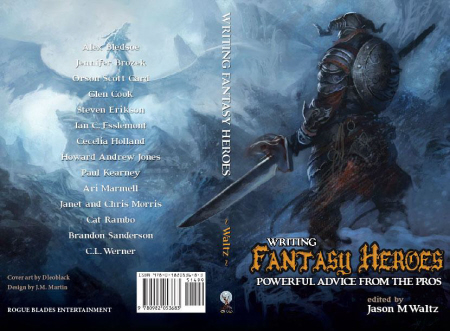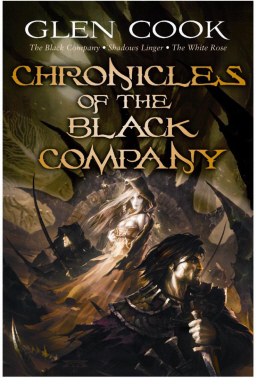James McGlothlin Reviews Writing Fantasy Heroes: Powerful Advice From the Pros
 Writing Fantasy Heroes: Powerful Advice From the Pros
Writing Fantasy Heroes: Powerful Advice From the Pros
Edited by Jason M. Waltz
Rogue Blades Entertainment (202 pp, $14.99, trade paperback, February 2013)
In recent days, Sarah Avery has been doing some excellent in-depth posts reviewing Writing Fantasy Heroes, a collection of essays from some of the best fantasy practitioners in the field. Having recently been one of the winners of a contest for this book, Black Gate has allowed me the opportunity to give my two cents concerning the book as well. I won’t pretend to improve on any of Avery’s review here. Rather, I’ll offer some comments on just a few of the essays that I reacted most strongly to.
For me, hands down, the chapter by Howard Andrew Jones concerning character development through dialogue was the best essay in the book. Jones, along with Saladin Ahmed and Ari Marmell (who also has a chapter in this volume), is part of a small but seemingly growing band of authors who are writing fantasy fiction in a Middle-eastern milieu — think 1001 Arabian Nights! In his essay, Jones shows how the discussions among characters in a story can go a long way towards fleshing out these characters. His examples were quite apt and I especially enjoyed the McCoy and Spock dialogue taken from the original Star Trek series.
Jones’s discussion reminded me of at least one reason why I enjoy books like George R. R. Martin’s A Song of Ice and Fire series as well as, say, Quentin Tarantino screenplays. Both artists do an excellent job of making their characters multi-faceted, and thus compelling, by the use of dialogue in their stories. I think Jones’s essay shows how poor interchanges among characters do more to make a story feel artificial than the use of fantasy tropes!
I’m a big fan of the “keep it simple” mindset. Brandon Sanderson’s chapter on how to write fight scenes seemed to follow this approach, at least in presentation. Sanderson is an accomplished author and is perhaps most famous for finishing Robert Jordan’s Wheel of Time series. Sanderson begins his chapter with a very bland example of a fight scene. Then, step-by-step, he proceeds to show how this same example could be improved upon. It was very insightful to see an expert at work and also helped to show why some author’s fight scenes read so ho-hum. Authors who are interested in writing fight scenes should definitely check out Sanderson here.
In terms of being just purely interesting, I found Paul Kearney’s chapter really engrossing. It reads something like a History Channel documentary. In this essay, Kearney addresses the realities of large-scale battles (i.e. war), especially those often not considered by authors. Kearney notes that if an author wants to write believably about war, she must concern herself with the following three questions: How was the army or force formed? How does it eat? And how does it fight?
 Personally, I had never thought about these first two questions before. I’ve always thought of war as mainly about battle logistics. But Kearney, basing his discussion upon real historical evidence, shows that an author needs to explain the vagaries of army life, if they want this facet of their story to be naturalistic. Again, whether or not you are an author, Kearney’s chapter is interesting just as a historical subject.
Personally, I had never thought about these first two questions before. I’ve always thought of war as mainly about battle logistics. But Kearney, basing his discussion upon real historical evidence, shows that an author needs to explain the vagaries of army life, if they want this facet of their story to be naturalistic. Again, whether or not you are an author, Kearney’s chapter is interesting just as a historical subject.
Some of the essays in this book, such as Glenn Cook’s, were just fun to read. Cook has been a writer in the field for a long time and his Black Company stories are must-reads for fantasy fans. His chapter in this book showcases his absorbing, and sometimes irreverent, style. His anecdotes are mesmerizing and even his offhanded comments are memorable. However — I don’t know if this is a plus or minus for Cook’s essay — in writing this review I had to go back and remind myself what the chapter was actually about. I seemingly lost his writing tips in the midst of his engaging prose!
Similarly, concerning Orson Scott Card’s essay, long time writer and probably most famous for his book Enders’ Game, I had the same reaction as I had to Cook’s essay: powerful and captivating prose — but what was that chapter about again? If anything, this shows that Cook and Card, being masters of fiction, are more comfortable there than writing non-fiction.
Though not a fiction author myself, I found the advice throughout Writing Fantasy Heroes to be thoughtful and very profitable for authors (with perhaps the exception of only one chapter). However, I think anyone interested in the fantasy genre will find this book worthwhile.
For as readers of this website most likely know, reading about literature helps one to actually enjoy literature more. In that light, I highly recommend this book to all fantasy authors and fans.
Besides being an avid horror and fantasy fan, James McGlothlin is currently finishing his dissertation in philosophy at Ohio State University
Thanks for the shout-out. I had the same problem with the Cook essay, too. It’s sort of form following function, but it’s also a bit disorienting.
I’m always curious to hear what people who don’t write fiction enjoy about books on writing. I’m glad you joined the conversation. And good luck on the dissertation!
Thanks for the excellent non-writer examination of WFH, James! I’m always interested in learning what essay(s) were most popular for any reader. Paul Kearney’s is regularly mentioned, as are many of the aspects you point out in others.
I haven’t heard the last observation before though – about losing the thread of Cook’s and Card’s essays. I can offer that your final thought (fiction vs. nonfiction) holds somewhat true as neither author was comfortable offering advice. As has been observed elsewhere, Cook’s most often stated words when asked for writing advice in the past have been “Just write!”
Thanks for the encouragement Sarah!
Thanks for the comment Jason. I didn’t mean my comments about Cook and Card’s essays as criticisms. If anything, I meant them to be indirect compliments. I absolutely LOVE Cook’s fantasy stuff! I’m not as familiar with Card’s, though I am familiar with his reputation. Again, thanks for the book! This one will NOT be going to the used book store as a trade-in.
[…] James Mcglothlin Reviews Writing Fantasy Heroes: Powerful Advice From the Pros […]
[…] Empire books that Cook discusses in his essay “Shit Happens” from Jason Waltz’ s Writing Fantasy Heroes. Anybody can die at any time and many […]